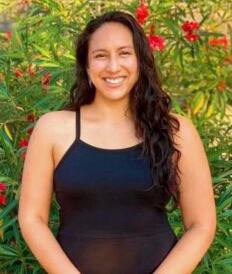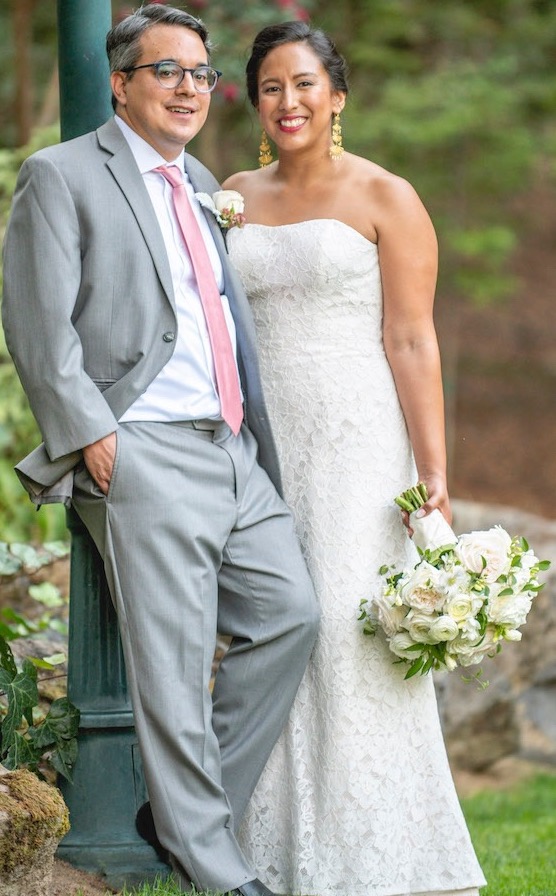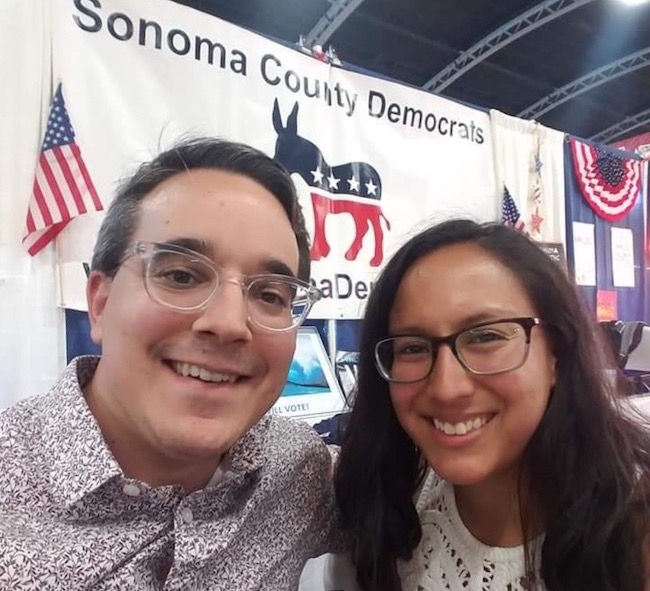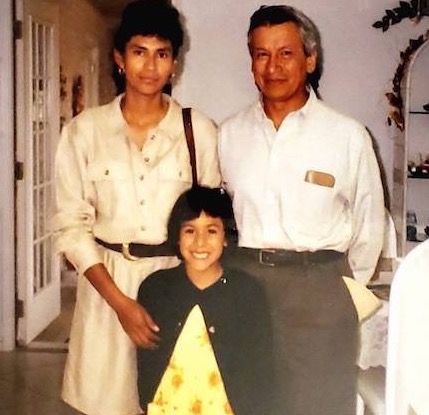
Sonoma County COAD Director & SCDP 2nd Vice-Chair
A Sonoma Dems romance and a passion for cultural understanding

A lot of people take credit for introducing community leaders Rocio Rodriguez and Scott Alonso. Most of them are Sonoma County Democrats. Rocio is fine with that, only noting that her first memory of Scott was when they volunteered together at Crab Feed in 2017. “After that we went on a hike with a friend and didn’t stop talking.” On Sept. 24, they got married, and are now traveling through Spain on their honeymoon.
Born in Ecuador, Rocio moved with her parents to New York in 1996 when she was 5 years old. Eventually, the family settled in Brownsville, Texas, where her dad was a Professor of Sociology at the University of Texas/Rio Grand Valley.


A passion for understanding cultures.“Growing up, I didn’t learn Spanish, though my parents spoke it at home. My dad experienced racism when he first came to the U.S. and would only speak to me in English, to spare me the difficulties he had as a recent immigrant. and I wasn’t allowed to speak Spanish in grammar school. I’m still not fluent,” she insists. “I’m insecure and don’t want to make a mistake!”
Rocio enrolled at Texas Tech and ended up spending 5 years earning a BS in Microbiology and a BA in Anthropology. “I became fascinated by different cultures and the movements of people, especially how diseases affect those movements.” She graduated in 2015, and decided to get some experience in public health – and to get out of Texas. “I’d had enough of being with conservative Republicans, even though I’d created a bubble with other Latinos and international students.”
From Texas Tech to Healdsburg. Through an AmeriCorps program, she spent 10 months at Alliance Medical Center in Healdsburg, and stayed 2 more years. “Healdsburg is a wealthy city, but that masks a huge need for good quality low-income medical services.” Alliance is part of a community health coalition that works to ensure that every person has a patient-centered health home. She and her team collaborated with Farm to Pantry to set up a food program.
East or West? In 2018, she decided to go for a Masters in Public Health at Columbia University in New York. She earned her degree this May 31, finishing the program online.
Torn between staying in New York and returning to California, she received an offer from Sonoma County COAD (Community Organizations Active in Disaster), a coalition of non-profits organized after the 2017 fires to prepare for disasters and coordinate services. She is now its Director.
“You need to communicate to all involved – city and county government and non-profits. You need to get to know people, to approach them with information that’s culturally relevant, to build trust via a trusted messenger.” Government focuses on saving lives during an emergency; non-profits provide comfort and care, especially for children and the elderly. “My job can be overwhelming, but I always want to know more. I always need to know what’s happening.”
Piling on leadership positions. Rocio added two major new responsibilities in 2021. She was elected 2nd Vice-Chair of the Sonoma County Democratic Party, focusing on our network of chartered clubs. This summer, she was appointed to the Sonoma County Advisory Redistricting Commission. Husband Scott is also on the SCDP’s central committee. He has served as Senior Field Representative for Assemblyman Marc Levine, and is now Public Information Officer for the Contra Costa District Attorney’s office.

About cultural misunderstanding. “People have such misconceptions. Latinos are siloed into a single bucket – they all speak Spanish, have brown hair and dark eyes. But there are Afro-Latinos who often are not recognized as Latinx and Black. And they are both. Racism and colorism plays a part in this. Also, there are so many different languages, from different countries, that are spoken in Latin America and the U.S., including indigenous languages that are not recognized. There is so much diversity right here at home. We need to suspend stereotypes.”
Listening to indigenous voices. “We’re so Eurocentric, so comfortable in our English-speaking world, that we don’t take the time to learn about those who are culturally rich outside of the “West.” Many of us are descendants of indigenous cultures but over time have lost a connection to them. We need to honor and protect those communities that continue to exist in spite of violence and efforts to erase their language and heritage. Indigenous and native people have a rich culture. Listen to them and learn from them.”
Recommended by Rocio:
- The Undocumented Americans by Karla Cornejo Villavicencio
- Borderlands by Gloria Anzaldua
- Youth, Identity, Power by Carlos Muñoz, Jr., Ph.D.
- Podcasts: Latino USA, Code Switch